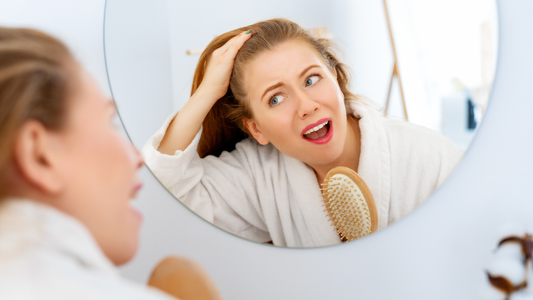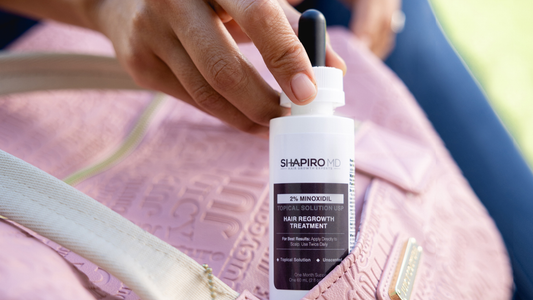Although it’s normal to lose strands of hair every day, losing more than normal can be alarming. If you’re also experiencing symptoms like weight gain, irregular periods, trouble getting pregnant, or unusual hair growth, you may be dealing with polycystic ovary syndrome (PCOS).
While PCOS is generally diagnosed or treated in relation to challenges with infertility, there’s more going on here, and hair loss is a common symptom of PCOS. Here’s what you should know about PCOS-related hair loss.
What is PCOS?
Polycystic ovary syndrome affects around 10% of women of childbearing age. It occurs when a woman produces excess male, or androgen, hormones. Women normally produce a small amount of male hormones naturally, but with PCOS they produce extra androgens, which can cause the body to develop more typically masculine features. PCOS is also often associated with problems in the ovaries, hence the name, where enlarged hair-like follicles can impede ovulation.
Women who suffer from PCOS may also have trouble getting pregnant, which is how many of them find out they have polycystic ovary syndrome.
With PCOS, hair may grow in unexpected places on the body, such as the face, chest, neck and abdomen, and PCOS can lead to hair loss on the scalp, known as androgenic hair loss. This thinning typically occurs near the front of the scalp.
Who PCOS Affects
PCOS generally affects women between the ages of 15 and 44, and it affects all ethnicities and races. Those who are overweight, obese, or have a family history of PCOS may be at higher risk as well.
Symptoms of PCOS
In order to tell if your hair loss is due to polycystic ovary syndrome, it helps to note some of the other symptoms of PCOS. PCOS-related hair loss typically occurs along the front hairline, but additional signs of PCOS include:
- Hirsutism, which is stiff hair grown on the face, lower abdomen, chest, back and inner thighs
- Missed or fewer periods
- Weight gain
- Acne on the chest, upper back and face
- Darkening of the skin underneath breasts, in the groin and along the neck
- Skin tags on the neck area or under the arms
- Deepening voice
- Decreased breast size
Causes of PCOS
The exact cause of polycystic ovary syndrome is unknown, but experts suspect it’s due to a complex combination of environmental and genetic traits. It’s theorized that high levels of insulin play a part. Insulin resistance may exacerbate the production of male hormones, which lead to physical manifestations of hyperandrogenism, such as hair loss. Obesity may also play a role, as this increases the risk of insulin resistance. Low-grade inflammation can also cause the ovaries to overproduce androgens.
Medical Treatment for PCOS Hair Loss
Although hair lost due to polycystic ovary syndrome will likely not grow back on its own, there are a number of treatments that may help to stimulate growth.
Some medical options include:
- Minoxidil (Rogaine®) - Minoxidil is a topical treatment that is FDA-approved and clinically proven to help grow hair. Applied to the scalp daily, it promotes hair growth and thickness.
- Birth control pills - Oral contraceptive pills are often combined with anti-androgen drugs to lower the levels of male hormones, which slows hair loss and improves other related PCOS symptoms.
- Aldactone - This is also often prescribed with birth control pills, as it treats androgenic hair loss.
- Finasteride (Propecia®) and Avodart - These meds are prescribed for male pattern baldness, and some doctors recommend them for PCOS hair loss, although they may cause unwanted side effects in women.
- Insulin-sensitizing agents - Because many women with PCOS have trouble with insulin levels, an insulin-sensitizing agent such as Metformin will make the body more receptive to insulin. Along with reducing the symptoms of PCOS, taking these agents may result in weight loss, improved fertility and lower cholesterol levels.
- Hair transplant - For those who want an alternative to medication, a hair transplant is a cosmetic surgery that takes hair and follicles from one area and transplants them into the area where thinning is occurring. It's generally a last resort and may not resolve the issue due to the ongoing hormona imbalances.
Home Treatment for PCOS Hair Loss
For those who want to go a more natural route, there are some other options for hair loss treatment that prioritize supplementation and lifestyle changes to improve general wellness over medical intervention. These include:
- Biotin - Biotin supplements have been used for years to help support generalized hair growth. Many suspect it also helps regain hair lost due to polycystic ovary syndrome.
- Zinc - Taking a daily supplement of zinc may also help with PCOS-associated hair loss. It may help reduce the growth of hair in other places.
- Saw palmetto - This supplement helps to fight the hormone DHT, or dihydrotestosterone, which is a male hormone that affects hairs at the follicle.
- N-acetyl Cysteine - This has also been shown to lower testosterone levels as well as improve insulin resistance.
- Weight loss - Since obesity is a strong risk factor in women with PCOS, losing weight may help reduce its effects. Research shows that most people who lose 5 to 10% of their weight will see a dramatic improvement in PCOS symptoms, including hair loss.
- Hair masks - Certain hair masks have been shown to help with hair health. An easy mask to do at home is to mix one egg with one teaspoon of olive oil and apply it to the hair from the roots to the tips. Leave in for at least 20 minutes and then wash out.
- Hair massage - Use a natural oil, such as jojoba, and massage it into the scalp to stimulate hair follicles for growth.
- Rosemary essential oil - This essential oil helps improve circulation in the scalp, which encourages hair growth.
Diet Support for PCOS Hair Loss
A quality diet is, of course, always recommended for overall health. However, it’s especially important if you suffer from hair loss and PCOS. Not only does it support normal physiology to balance hormones, but it also often results in weight loss, which is important to combat PCOS symptoms.
The focus should be on eating whole and natural or minimally processed foods. Eat a variety of vegetables and fruits, lean meats, whole grains such as brown rice and quinoa, wild seafood, and healthy fats such as avocados, almonds and olive oil.
Along with focusing on what you should eat, you should also be aware of things to avoid. Stay away from, or limit your intake of:
- Processed foods
- Sugar
- Artificial sweeteners, flavors and colors
- Bad fats like hydrogenated oils
- Alcohol
You can also supplement your diet with vitamins and other nutrients. This includes fish oil and vitamin D. Drinking a cup of spearmint tea daily helps you stay hydrated and is also reported to help reduce testosterone and balance hormones.
Minimize the Appearance of Hair Loss
While trying other treatment options, there are ways that you can wear your hair that can make PCOS hair loss less obvious. If you have a general thinning of hair, try using volumizing products that make the hair look fuller. You can try a new hairstyle, as a layered style will add more volume. There is also a wig fall, which is a partial wig, to cover the thinning areas.
If you have bald spots, a scarf or headband that covers bald patches may be a compelling solution. A low ponytail or a loose, messy bun, may make them less visible too.
If you’re losing hair around your part, and it’s beginning to widen, you can try a few different things. Apply a cover-up powder to the roots to make the part less obvious, part your hair a different way, or experiment with bangs that begin closer to the top of your head.
Get Help With Your PCOS Hair Loss
Dealing with hair loss is sensitive for women, but there are good solutions for hair growth.
Shapiro MD uses telemedicine to help men and women access prescription hair loss treatments from home, if appropriate. It begins with an online consultation process and ends with a custom treatment plan for you and your hair condition. Whether you suffer from PCOS-related hair loss or some other condition, our licensed physicians can help.




